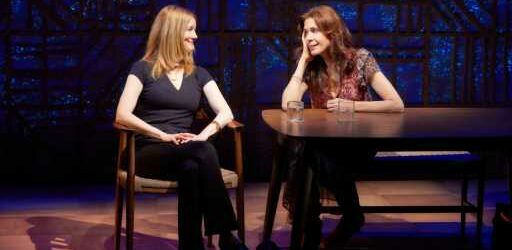Friends come and go. Some stay throughout our lives while others, however significant for a time, fade into the haze of memory yet always linger within us.
In “Summer, 1976,” the new Broadway play by David Auburn (“Proof”) about a short-yet-significant friendship, Laura Linney and Jessica Hecht — two of the most accomplished and compelling actors around — create a pair of indelible characters looking back at their brief relationship during a long-ago season. (The title tells you exactly when.)
Sure to have future life on other stages, the play is an insightful and engaging two-hander that will have audiences pondering the nature of friendship, the values we place on it, and even how well we really know each other.
Auburn presents two very different women telling and then reliving the history of their evolving friendship as it grows and, eventually, fades, charting their story with humor, compassion and complexity. The playwright crafts dual portraits of both intimacy and distance as details of these women’s lives and their relationship are revealed throughout the past and present.
Alice (Hecht) is a ’70s woman who dropped out of college to become a mother and marry an economics professor now on the tenure track. She is an easy-going spirit of the newly liberated times, yet, as her friend points out in an argument, she has wound up in the most conventional of middle-class lives, maintaining a nice little house and being “a faculty parent on a tight budget.”
In a different class is Diana (Linney), a single mother who teaches art at the college. She is stylish, wry and opinionated, turning condescension into an art form and dropping words like “jejune” and “le mot juste” into conversations like truffles on meatloaf. Yet despite her independence, intelligence and security (family money helps), she is unhappy, unable to finish her degree or her artwork and instead obsesses about home decor and perfect parenting.
Within the limbo of John Lee Beatty’s artful set evoking the era (with a touch of the artist Paul Klee, whose work figures into the play), these opposites meet reluctantly and abrasively through their five-year-old daughters, who have bonded. Over gestures small (a shared reefer, a generous gift) and large (offering comfort during health and marriage crises), the women gradually grow closer.
The friendship ebbs and flows as each woman gleans biographical information from the other, making assumptions, determining how much to ask, wondering when to push the other, when to let go, when to hold tight — and sometimes getting it wrong.
But if one is expecting a kind of wistful “Love Letters” on the nature of friendship, think again. As their twin narratives continue, Auburn jostles audience expectations, steering the story away from potentially melodramatic plot points, eschewing sentimentality — even offering a flight of fancy or two. When the storytelling returns to the present in the end, it does so in a scene that is both real and relatable.
There’s not one false note in director Daniel Sullivan’s clear direction or in the natural yet precise performances of Linney and Hecht, who are working at the top of their game and together offer a master class in acting.
Dressed in timeless art-school black, Linney is deliciously dry in her portrait of a woman seemingly self-aware and in control, yet lost and vulnerable, too. She also gives just the right amount of “tang,” as her character would say, to the uncertainty in her certitude. Linney’s enthralling telling of a sexual encounter is also a surprising delight.
Wearing a vintage dress (another spot-on choice by costumer Linda Cho), Hecht is as loose-yet-grounded as Diana is tightly-wound-yet-unmoored. Still, underneath it all Hecht suggest her character’s own world of doubts and insecurities. Her comic “whatever” timing is also delectable.
“People just aren’t one thing,” says Alice when Diana makes an assumption based on her friend’s middlebrow choice in reading material. Neither are friendships, and Auburn’s play elegantly shows that sometimes they can have a multitude of impactful meanings — sometimes resonating throughout a lifetime.
Read More About:
Source: Read Full Article


